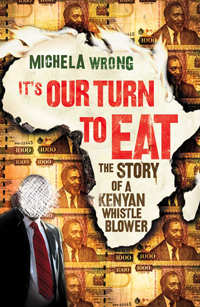Salvation is Not Ours to Bestow: A Review of Michaela Wrong’s new book
 Michaela Wrong’s gripping latest book, It’s Our Turn to Eat: The Story of a Kenyan Whistleblower, is the antidote for anyone who knows the weariness of wading through the jargon of implementation plans and institutional treatises on governance and anticorruption. It’s the anti-boredom serum, the potion that brings you the real consequences of what happens when those plans are ignored.
Michaela Wrong’s gripping latest book, It’s Our Turn to Eat: The Story of a Kenyan Whistleblower, is the antidote for anyone who knows the weariness of wading through the jargon of implementation plans and institutional treatises on governance and anticorruption. It’s the anti-boredom serum, the potion that brings you the real consequences of what happens when those plans are ignored.
On one level, the book is the story of one John Githongo, the eponymous whistleblower. A former journalist and pro-transparency activist, Githongo was handpicked in the euphoria following the 2002 Kenyan election to serve as the new president’s special anti-corruption advisor. “The era of ‘anything goes’ is gone forever,” declared Kibaki in his acceptance speech, “Corruption will now cease to be a way of life in Kenya.”
But when life very quickly began imitating that old Who song (“Meet the new boss, same as the old boss,”) Githongo fled the country, fearing for his life, with the tapes and documents that would blatantly incriminate government officials—up to the highest rungs—in a $500 million corruption scandal.
On a different level, Wrong’s book is also the story of an international movement. Githongo was up against the looters and thugs who threatened to silence him. But he also found himself on the wrong side of the fence from much of the donor community, which wanted Kenya’s new president to be part of a generation of democratic leaders paving the way for a new and prosperous Africa.
As Githongo gasped for air, Tony Blair was boosting DfID's aid commitments to Africa and launching the Year of Africa:
Playing to the industrialized world’s guilt complex, the Make Poverty History Campaign, Africa Commission and Gleneagles summit all shared one characteristic: the emphasis was on Western, rather than African action. Top-down, statist, these initiatives were all about donor obligations, pledges, and behaviour. What they definitely weren’t about…was highlighting the shortcomings of African governments set to benefit from future Western largesse.
It’s Our Turn to Eat is an unblinking look at the roots and the consequences of sleaze (the violence during Kenya’s recent elections, a referendum on the corrupt leaders’ failure to spread the wealth, was the worst Kenya had seen since independence). It is also a condemnation of “the Western tendency to turn a blind eye to blatant graft and routine human rights abuse in the eagerness to save ‘the poorest of the poor’.”
Despite Nairobi booksellers’ reluctance to stock the book, Kenyans are buying the book off street corners, reading it aloud on the radio, and debating it in church groups. Still, some of the best advice Wrong has to offer is for her Western readers.
Worried Westerners, who so often seem to fall prey to a benign form of megalomania when it comes to Africa, would do well to accept that salvation is simply not theirs to bestow. They should be more modest, more knowing, and less naïve.
 From Aid to Equality
From Aid to Equality
